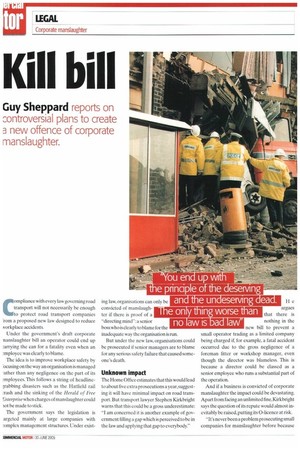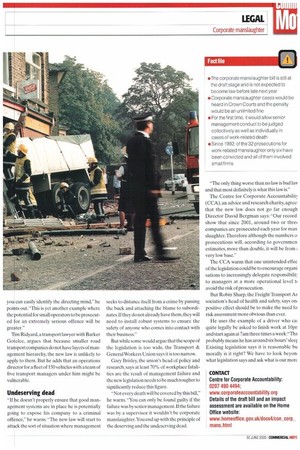Kill bi II
Page 40

Page 41

If you've noticed an error in this article please click here to report it so we can fix it.
Guy Sheppard reports on :ontroversial plans to create a new offence of corporate manslaughter.
Compliance with every law governing road transport will not necessarily be enough to protect road transport companies !I-0m a proposed new law designed to reduce workplace accidents.
Under the government's draft corporate nanslaughter bill an operator could end up :arrying the can for a fatality even when an rnployee was clearly to blame.
The idea is to improve workplace safety by :ocusirig on the way an organisation is managed -atber than any negligence on the part of its 3mployees. This follows a string of headline;rabbing disasters such as the Hatfield rail ;rash and the sinking of the Herald of Free Enterprise when charges of manslaughter could lot be made to stick.
The government says the legislation is .argeted mainly at large companies with ;omplex management structures. Under exist ing law, organisations can only be convicted of manslaughter if there is proof of a "directing mind": a senior boss who is clearly to blame for the inadequate way the organisation is run.
But under the new law, organisations could be prosecuted if senior managers are to blame for any serious safety failure that caused someone's death.
Unknown impact
The Home Office estimates that this would lead to about five extra prosecutions a year,suggesting it will have minimal impact on road transport. But transport lawyer Stephen Kirkbright warns that this could be a gross underestimate: "I am concerned it is another example of government filling a gap which is perceived to be in the law and applying that gap to everybody." argues that there is nothing in the new bill to prevent a small operator trading as a limited company being charged if, for example, a fatal accident occurred due to the gross negligence of a foreman fitter or workshop manager, even though the director was blameless. This is because a director could be classed as a senior employee who runs a substantial part of the operation.
And if a business is convicted of corporate manslaughter the impact could be devastating. Apart from facing an unlimited fine,ICirkbright says the question of its repute would almost inevitably be raised, putting its 0-licence at risk.
"It's never been a problem prosecuting small companies for manslaughter before because you can easily identify the directing mind," he points out. "This is yet another example where the potential for small operators to be prosecuted for an extremely serious offence will be greater."
Tim Ridyard, a transport lawyer with Barker Gotclee, argues that because smaller road transport companies do not have layers of management hierarchy, the new law is unlikely to apply to them. But he adds that an operations director for a fleet of 150 vehicles with a team of five transport managers under him might be vulnerable.
Undeserving dead "If he doesn't properly ensure that good management systems are in place he is potentially going to expose his company to a criminal offence,he warns. -The new law will start to attack the sort of situation where management seeks to distance itself from a crime by passing the buck and attaching the blame to subordinates. If they do not already have them, they will need to install robust systems to ensure the safety of anyone who comes into contact with their business."
But while some would argue that the scope of the legislation is too wide, the Transport & General Workers Union says it is too narrow.
Gary Brisley, the union's head of policy and research, says at least 70% of workplace fatalities are the result of management failure and the new legislation needs to be much tougher to significantly reduce this figure.
"Not every death will be covered by this bill," he warns. "You can only be found guilty if the failure was by senior management. If the failure was by a supervisor it wouldn't be corporate manslaughter. You end up with the principle of the deserving and the undeserving dead. -The only thing worse than no law is bad lay and that most definitely is what this law is."
The Centre for Corporate Accountabilit, (CCA), an advice and research charity, agree: that the new law does not go far enough Director David Bergman says: "Our record. show that since 2001, around two or threi companies are prosecuted each year for man slaughter. Therefore although the numbers o prosecutions will, according to governmen estimates, more than double, it will be from ; very low base."
The CCA warns that one unintended effec of the legislation could be to encourage organi sations to increasingly delegate responsibilit: to managers at a more operational level IA avoid the risk of prosecution.
But Robin Sharp, the Freight Transport As sociation's head of health and safety, says on positive effect should be to make the need fo risk assessment more obvious than ever.
He uses the example of a driver who cal quite legally be asked to finish work at lOpn and start again at 7am three times a week:"Tha probably means he has around six hours' sleei Existing legislation says it is reasonable bu morally is it right? We have to look beyon. what legislation says and ask what is our mon


































































































































































































